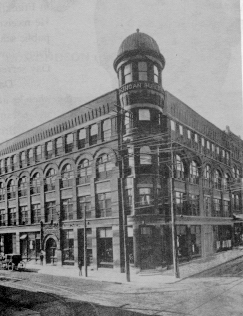The first officers were the Reverend R. H. Boyd, president; attorney James Carroll Napier, cashier; and the Reverend Preston Taylor, treasurer and chairman of the board. The bank opened on January 16, 1904. Its first home was donated space in Napier's law office, located at 411 North Cherry Street (present Fourth Avenue, North). The proclaimed intention of the bank was to "encourage frugality and systematic savings among our people, to secure the safekeeping and proper investment of such savings, and to set in motion business enterprises...." Trust in Negro institutions had deteriorated with the fall of the Freedman's Bank, so it was necessary to regain confidence to make the undertaking a success.
There were no state laws governing banking institutions when the bank obtained its charter, but the founders of the bank were very conservative in their policies. When the new banking enterprise exhibited slow growth, Boyd reminded investors that "the idea of 'getting rich quick' was never in the minds of the officers of this institution." He and other board members believed that growth was not as significant as stability and permanence. Napier maintained that it was more important to teach blacks that deposits not only earned interest but also assisted in the economic advancement of the race. Although the bank's name implied that an account could be opened with one cent, the minimum deposit accepted was ten cents. Stock could be purchased at the low price of five dollars per share, in the hope that it would be "within the reach of the common people." The day the bank opened, deposits totaled almost $6,500; after six years of business, the deposit balance showed just under $36,000.
The One Cent Bank insured new capital stock after World War One and was reorganized, changing its name to Citizens Savings Bank and Trust Company in 1920. The capital raised from the new stock was invested in blue chip railroad stock and a few large real estate loans, in efforts to avoid failure at all costs.
In 1972, after fifty years of occupancy, Citizens
 Savings Bank and Trust Company was forced from
Savings Bank and Trust Company was forced fromthe Colored YMCA. This building had previously served
as the Duncan Hotel, a leading hotel during the late 1900s and early l900s. The bank relocated temporarily in the Morris Memorial Building. In 1979, the Citizens Bank opened its first branch office at Twenty - first Avenue, North and Jefferson Street. Of the four Afro-American banking institutions in Tennessee before 1930, only the One Cent and Trust Company of Nashville, the second oldest minority bank in the country, survived.
Citizens Savings Bank and Trust Company maintains the essence of the tenets of its founders: while it is "important to grow, it is also important to remain profitable and even more important to remain sound." Today this bank serves as a depository for many residents of the community and for some funds of the Metropolitan Government of Nashville and Davidson County, the State of Tennessee, and the United States Government.
In 1985, the bank moved to its new skyscraper headquarters, Citizens Plaza, on the southwest corner of Fourth Avenue, North, and Charlotte Avenue, the same site it occupied when the Colored YMCA stood there.